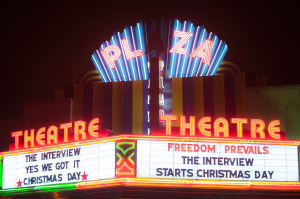 When it comes to censorship, it’s Beijing — not Pyongyang — that poses the real threat to Hollywood.
When it comes to censorship, it’s Beijing — not Pyongyang — that poses the real threat to Hollywood.
BY ISAAC STONE FISH
Isaac Stone Fish is Asia editor at Foreign Policy, where he edits, reports, and writes stories from across the region.
Previously a Beijing correspondent for Newsweek, Isaac wrote stories on such subjects as the Dalai Lama’s effect on international trade, China’s love affair with rogue states, and crystal meth in North Korea, a country he has visited twice. A fluent Mandarin speaker, Isaac spent seven years living in China prior to joining FP; he has traveled widely in the region and in China. His articles have also appeared in the New York Times, the Economist, the Washington Post, and the Los Angeles Times, and he has appeared as a commentator on MSNBC, BBC, NPR, Al-Jazeera, and PRI, among others.
DECEMBER 31, 2014
What if ‘The Interview’ Took Place in China?
The television host Dave Skylark, played by James Franco in The Interview, wants to know why people hate him and what he represents. Why do some people detest his right to host a trashy talk show about Eminem’s sexual preferences and Rob Lowe’s baldness? “Do they hate us because they ain’t us?” he asks his longtime producer Aaron Rapoport, played by Seth Rogen.
Seen in the context of the tempest that The Interview created, it’s tempting to pose that question about American popular culture. Did the shadowy terrorist group Guardians of Peace — the allegedly North Korea-backed organization that threatened Sony, and caused them to pull The Interview from theaters — do what they did because they hate America’s right to produce trashy movies featuring gratuitous sex scenes and jokes about camel toes? And was Sony’s decision to reverse course and release the film a victory for “us” against our haters? (Rogen, who tweeted “Freedom has prevailed!” after Sony announced their new decision, certainly thought so.)
But like so much about this dumb buddy comedy and the controversy it caused, those questions are misleading. Hollywood’s biggest worry about freedom of expression is not North Korea, or terrorist groups, or those who make anonymous threats to movie theaters. And celebrating our “freedom” over North Korea, an impoverished state of 25 million, is both sad and laughable.
The far bigger worry is self-censorship — and there’s no bigger threat here than China. The Chinese don’t hate us because they are like us, or because they are not. In fact, they don’t hate us at all. Beijing poses a major censorship threat because the ruling Chinese Communist Party is keenly sensitive to criticism and has the economic muscle to punish those in Hollywood who make films that displease it.
